|
|
|
Sort Order |
|
|
|
Items / Page
|
|
|
|
|
|
|
| Srl | Item |
| 1 |
ID:
081861
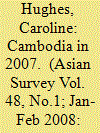

|
|
|
|
|
| Publication |
2008.
|
| Summary/Abstract |
This year saw continued economic growth but increasing discontent over inequality and dispossession. Mindful of upcoming elections, Prime Minister Hun Sen declared a "war on land-grabbing," with little practical effect. Infighting within the political opposition consolidated the government's electoral prospects, while the protests of the poor were forcibly suppressed.
|
|
|
|
|
|
|
|
|
|
|
|
|
|
|
|
| 2 |
ID:
086700
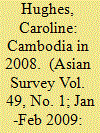

|
|
|
|
|
| Publication |
2009.
|
| Summary/Abstract |
The Cambodian People's Party (CPP) consolidated legislative control with a decisive election victory in 2008. Four contributing factors are identified: CPP control of local authorities who can deliver the vote, its marginalization of the opposition, the mass patronage enabled by an economic boom, and exploitation of a border dispute with Thailand.
|
|
|
|
|
|
|
|
|
|
|
|
|
|
|
|
| 3 |
ID:
065379
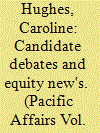

|
|
|
| 4 |
ID:
153422
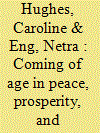

|
|
|
|
|
| Summary/Abstract |
Cambodia’s youthful population is significantly responsible for a recent unexpected decline in the popularity of the Cambodian People’s Party, which has governed since the end of the Khmer Rouge regime. This increasingly young electorate has lived through an era of peace and openness with regular multi-party elections and impressive economic growth resulting in rapid structural change in the economy. Compared to their parents’ generation, this younger generation is better educated, highly mobile, aspires to salaried employment, and is well connected to new sources of information and technology. Because of this, their expectations, aspirations, opportunities, as well as challenges they face are remarkably different from those of older generations. However, Cambodia’s institutions of governance, dominated by personalized and patron–client networks that have been propped up by the ruling elite, has effectively marginalized this emerging youth population. This marginalization from political and economic resources has produced alienation and discontent, which represents a significant political problem for the ruling party’s political strategies.
|
|
|
|
|
|
|
|
|
|
|
|
|
|
|
|
| 5 |
ID:
065376
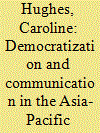

|
|
|
| 6 |
ID:
110104
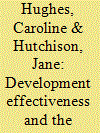

|
|
|
|
|
| Publication |
2012.
|
| Summary/Abstract |
International aid agencies have experienced a 'political turn' over the past decade, with political economy analyses becoming increasingly numerous as a means to drive development effectiveness. Yet aid agencies have so far failed to shift their aid modalities in response. The problem lies in an inadequate conceptualisation of 'politics'. Most donors continue to see development as a public good, rather than as the focus of contestation in a context of societal struggle, and consequently fail to take oppositional forces sufficiently seriously. This facilitates the misapplication of terms such as 'partnership' and 'ownership', contributing to failures in efforts to promote reform. A more truly political analysis of aid intervention entails two innovations: the use of structural analysis to distinguish between interests in reform; and the use of this distinction, in turn, to inform the practice of taking sides in political struggles. Case studies of international aid programmes in Cambodia and the Philippines illustrate how the failure of donors to take sides with particular reformers has resulted in lost opportunities to achieve concrete outcomes from development projects.
|
|
|
|
|
|
|
|
|
|
|
|
|
|
|
|
| 7 |
ID:
064773
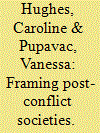

|
|
|
| 8 |
ID:
123991
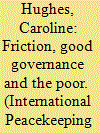

|
|
|
|
|
| Publication |
2013.
|
| Summary/Abstract |
Friction is a zone of contingency where creative responses of local and international agents produce unexpected effects. Viewing 'good governance' in this light allows better appreciation of the blurring of boundaries between international prescriptions and local cultures, often regarded as antithetical in the Cambodian case. In fact, actors in Cambodia mobilize both a newly invigorated domestic cultural discourse and international ways of working to pursue struggles over development in the post-conflict context. However, elite actors are much better placed to do this successfully than are the poor.
|
|
|
|
|
|
|
|
|
|
|
|
|
|
|
|
| 9 |
ID:
117526
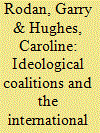

|
|
|
|
|
| Publication |
2012.
|
| Summary/Abstract |
International aid agencies are increasingly placing social accountability at the heart of their governance reform programs, involving a range of social activist mechanisms through which officials are rendered answerable to the public. Crucially, aid agencies are not just promoting these mechanisms in emerging democracies, but now also in authoritarian societies. What then are the likely political regime effects of these mechanisms? We approach this by examining who supports social accountability, why, and the implications for political authority. Focusing on the Philippines and Cambodia cases, it is argued that, to differing degrees, social accountability mechanisms have been subordinated to liberal and/or moral ideologies favoring existing power hierarchies. These ideologies often privilege nonconfrontational state-society partnerships, drawing activists into technical and administrative processes limiting reform possibilities by marginalizing, or substituting for, independent political action pivotal to the democratic political authority of citizens.
|
|
|
|
|
|
|
|
|
|
|
|
|
|
|
|
| 10 |
ID:
114975
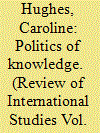

|
|
|
|
|
| Publication |
2012.
|
| Summary/Abstract |
A new casting of diasporas, exiles and returnees as potentially transformative agents in post-conflict polities is the topic of this article. 'Return of Qualified Expatriates' programmes have recently been launched by international agencies in a number of post-conflict countries in an attempt to promote better capacity-building within post-conflict states institutions. This article argues that the ostensible technical orientation of these programmes is misleading, and they have a political significance which is noted and contested locally. In political terms, they represent attempts to smuggle Western hierarchies of knowledge into post-conflict reconstruction efforts under the cover of ethnic solidarity, to the detriment of local participation and empowerment. The article argues further that this is always contested by interested parties locally, often by mobilising alternative capacities, labelled 'authentic', in opposition. As such, strategies that attempt to use ethnic ties to overcome this local contestation are placing a significant burden on ethnic categories that are slippery, malleable and contested in post-conflict contexts. These points are demonstrated with reference to the cases of Cambodia and Timor-Leste.
|
|
|
|
|
|
|
|
|
|
|
|
|
|
|
|
| 11 |
ID:
139233
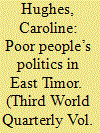

|
|
|
|
|
| Summary/Abstract |
Poor people attempting to claim a share of resources in post-conflict societies seek allies internationally and nationally in attempts to empower their campaigns. In so doing, they mobilise the languages of liberalism, nationalism and local cultural tradition selectively and opportunistically both to justify stances that transgress the strictures of local culture and to cement alliances with more powerful actors. In the case of poor widows in East Timor the languages of nationalism, ritual and justice were intermingled in a campaign aimed at both international actors and the national state in a bid to claim a position of status in the post-conflict order.
|
|
|
|
|
|
|
|
|
|
|
|
|
|
|
|
| 12 |
ID:
074918
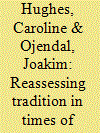

|
|
|
|
|
| Publication |
2006.
|
| Summary/Abstract |
This collection of articles focuses on the interrelationship of tradition and change in the Cambodian context. In doing so, it seeks to achieve a number of objectives: first, to contribute to the debate over the role of 'culture' in political life in Cambodia; second, to challenge some of the preconceptions about the nature of 'culture' in general, and Cambodian culture in particular, upon which that debate has been based; and third, to achieve these first two aims by bringing together in productive dialogue recent speculations on Cambodia in the disciplines of political science and anthropology. As such, the symposium seeks to reflect on the relationship between culture and politics; the implications of different framings of this relationship for the politics of contemporary international engagement with Cambodia; and the implications of these for the disciplinary lenses commonly adopted by political scientists and anthropologists.
|
|
|
|
|
|
|
|
|
|
|
|
|
|
|
|
| 13 |
ID:
139227
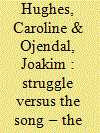

|
|
|
|
|
| Summary/Abstract |
This introduction presents how views on ‘the local turn’ in peacebuilding has evolved into a significant discourse. Currently, it has ‘its moment’ and is widely used by theorists and practitioners alike, by normative localists as well as by liberal policy-makers, albeit for different reasons and with differing intensions. We suggest that international interventions for the purpose of peacebuilding cannot be justified a priori, but requires resonance at the ‘receiving end’, which the local dimension potentially offers. It is however an elusive and contested concept that requires thorough scrutiny and critical assessment. Here a collection of conceptual and empirical articles is contextualised and introduced, painting a broad state-of-the-art of the pros and cons of the local turn.
|
|
|
|
|
|
|
|
|
|
|
|
|
|
|
|
| 14 |
ID:
169729


|
|
|
|
|
| Summary/Abstract |
There is said to be a strong relationship between low winter fuel consumption and increased cold-related morbidities and mortalities in the elderly. However, no study has so far investigated baseline domestic thermal conditions, energy and health in this demographic - a crucial gap given an ageing population. Hence we examine, for the first time, the validity of current thermal comfort standards and World Health Organisation minimum temperature thresholds in the 65 + demographic, through a longitudinal study of thermal conditions in homes of the elderly. We cover two typical winters using repeated monthly surveys and continuous temperature monitoring in living and bed rooms. Results demonstrate that the widely used ISO7730 model significantly underpredicts comfort in this demographic. We use our data to create a new model for the elderly, with a 40% lower error rate. Using calibrated computer models, we demonstrate that our model predicts a 44% reduction in winter heating demand, compared to the current model. Finally, our data provides little evidence for an association between low indoor temperature and healthcare visits for a variety of morbidities. These results question current assumptions around thermal comfort and health in the elderly, with potential implications for health and energy policy.
|
|
|
|
|
|
|
|
|
|
|
|
|
|
|
|
|
|
|
|
|